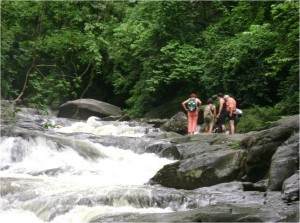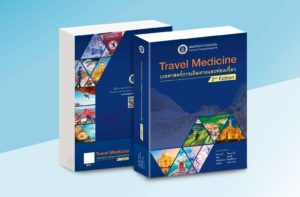Everyone enjoys traveling; falling ill while traveling is unpleasant and can be worrying not to know what is happening or what to do next, especially being away from home.
It is not uncommon to wake up with a fever, a bit of nausea after being bitten by a few mosquitoes a week or two ago. You recall having been informed about malaria, dengue and other tropical diseases transmitted by mosquito on your visit to the travel clinic. Now it seems that you have fever, what should you do?
First of all, don’t panic. Let’s discuss about malaria first. In Thailand malaria transmission is limited to certain area around the borders of the country. However, if you develop a fever after having been trekking in the forest, exploring waterfalls, it would be necessary to know if it the fever is caused by malaria. You should go to see a doctor without delay. Malaria is treatable with effective anti-malarial medications. Cure and complete recovery are expected after successful treatment.

Waterfall near Thai_Myanmar border where malaria exist
Dengue on the other hand, is an urban disease. You can get dengue even you stay in big city such as Bangkok or Chiangmai. Most travelers with dengue infection will develop a fever with some uneasiness or discomfort, which many might mistake as flu. This is because the majority of individuals infected with dengue virus might have very mild non-specific symptoms which is difficult to distinguish from other diseases. For those who develop mild to moderate symptoms could have persistent high fever, associated with a headache which hurts over the eyes and forehead or flushing of the face including the neck.
There is almost always a loss of appetite, tends to taste weird and when the anorexia worsen, vomiting ensue. Severity of aches over the body and joints may vary from person to person but rarely someone experiences debilitating or excruciating bone pain. The feared sign of dengue infection is the bleeding manifestation. Mostly it would occur well after the 3rd day of illness, bleeding from the gums is more common and infrequently nose bleeds. Very few percent of people with dengue infection will turn into a severe form i.e. dengue shock which require intensive medical treatment.
Early diagnosis and proper treatment of dengue is a key. Here at the our Travel clinic, our doctors are experts in Tropical Medicine who are vigilant in diagnosing based on the history, clinical findings on physical examination and use of diagnostic kits such as the dengue antigen detection test kit or the dengue NS1 antigen (NS1Ag) test kit. This test is done using small amount of blood and the result is available in less than an hour. The advantage for the test kit is that it can be used early in the course of illness. It is also accurate and could confirm dengue infection.


Leave a Reply